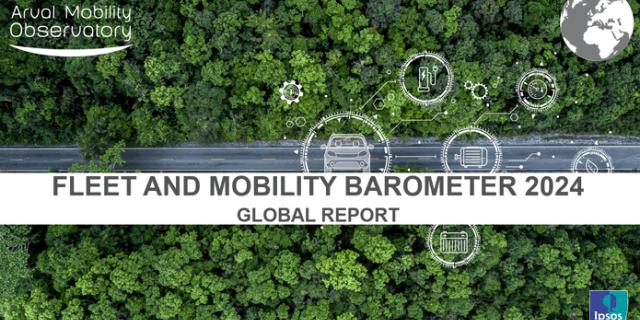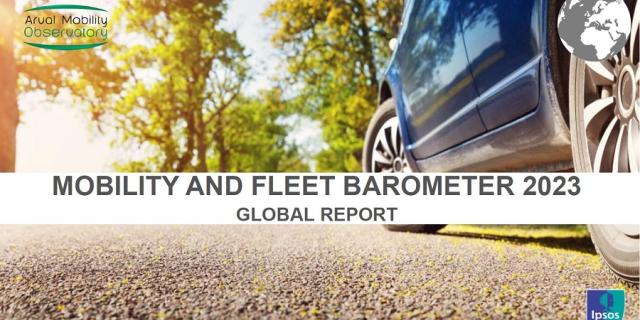Traduction en français en cours
-
Commute times and distances are rising, while remote work remains steady: necessity to address employees' commuting needs
-
Significant boost in corporate mobility offerings with direct impact on employee satisfaction
The Employee Mobility Survey 2024, an independent study completed by Arval Mobility Observatory in cooperation with Ipsos, highlights current practices and expectations of employees regarding their company’s mobility offers.
As the corporate world adapts to the evolving landscape of work, the significance of employee mobility has never been more important. The "Employee Mobility Survey 2024" provides insights into how employees perceive, and value their company's mobility offers. The survey provides valuable insights into the commuting habits and preferences of employees. Its findings conclude that employee mobility is a key factor as a strategic lever for enhancing satisfaction, retention, and attracting new talent.
REMOTE WORKING REACHES A PEAK WHILE COMMUTING TIME INCREASES SINCE 2022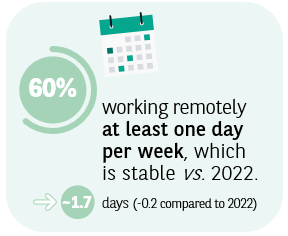
Remote working seems to be reaching a peak across Europe, with 60% of the employees working at least 1 day remotely (similar to 2022), while the average number of days per week working remotely have slightly decreased (1.7 days in 2024, a 0.2 decrease compared to 2022).
Additionally, the commuting time has increased since 2022, despite similar distances for home-work trips, with 42% of respondents declaring their commuting time being more than 30 minutes (an additional 4 pts compared to 2022). This comes in a context where the average distance has not materially changed (59% employees living less than 20 km, and 41% less than 20 km) across Europe, with only one country – France – where both distance and time to commute increased.
BUSINESS TRIPS AND COMMUTING: CARS REMAIN DOMINANT
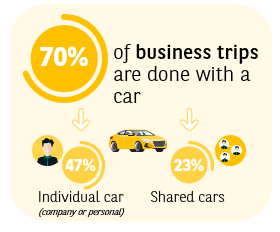 Zooming on business trips – while there is still a significant number of employees doing business trips, the frequency of them is starting to decrease - only 10% of employees are travelling for business at least once a week, compared to 16% in 2022. The countries that show the biggest decrease in terms of business travel compared to 2022 are France (52% of employees are doing business trips, a decrease of 8pts compared to 2022) and Belgium (43% in 2024, a decrease of 8 pts compared to 2022).
Zooming on business trips – while there is still a significant number of employees doing business trips, the frequency of them is starting to decrease - only 10% of employees are travelling for business at least once a week, compared to 16% in 2022. The countries that show the biggest decrease in terms of business travel compared to 2022 are France (52% of employees are doing business trips, a decrease of 8pts compared to 2022) and Belgium (43% in 2024, a decrease of 8 pts compared to 2022).
In this context, the survey reveals that while the use of individual cars for commuting remains stable at 71%, for business trips the car is also favoured at 70% (47% - individual cars and 23% - shared cars), followed by trains (32%) and planes (29%).
ALTERNATIVE MOBILITY SERVICES ARE RIDING HIGH FOR CORPORATES & EMPLOYEES
While individual car usage remains dominant for commuting, the overall utilization of alternative mobility services implemented by corporates is high, with nearly 80% of employees using these options. This comes in the context of corporates offering more mobility options, as 65% of companies are offering at least one (an increase of 10% / +6pts versus 2022). Germany, France and the Netherlands have caught up with Belgium, while Spain and Italy still lag behind.
This increase in the corporate offers seems to be linked with employees’ satisfaction: 50% of the employees a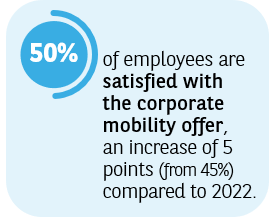 re satisfied with their company’s mobility offer, an increase of 11% compared to 2022 (from 45%). These results are coming mostly from France (54%, increase of 12pts versus 2022), Belgium (63%, increase of 12pts versus 2022), and the Netherlands (74%, increase of 11 pts versus 2022), where improvements to those offers have been most significant, compared to 2022.
re satisfied with their company’s mobility offer, an increase of 11% compared to 2022 (from 45%). These results are coming mostly from France (54%, increase of 12pts versus 2022), Belgium (63%, increase of 12pts versus 2022), and the Netherlands (74%, increase of 11 pts versus 2022), where improvements to those offers have been most significant, compared to 2022.
A robust 55% of employees anticipate that companies will enhance their mobility offerings within the next five years, with French and Dutch employees exhibiting strong confidence levels of over 64%.
CORPORATE MOBILITY SOLUTIONS INFLUENCE CAREER MOVES
Th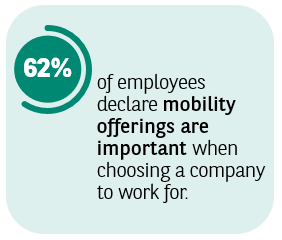 e study also highlights the importance of corporate mobility solutions in the decision-making process for job seekers. With 62% of employees considering mobility offerings important when choosing a company, it seems that effective mobility strategies can serve as a lever for attracting new talent and enhancing employee satisfaction. What is more, this criterion is important for 72% of people who plan to leave their jobs in the next 6 months; and important for 3 out of 10.
e study also highlights the importance of corporate mobility solutions in the decision-making process for job seekers. With 62% of employees considering mobility offerings important when choosing a company, it seems that effective mobility strategies can serve as a lever for attracting new talent and enhancing employee satisfaction. What is more, this criterion is important for 72% of people who plan to leave their jobs in the next 6 months; and important for 3 out of 10.
“This data presents a compelling narrative for corporations: embracing mobility solutions is not merely a trend but a strategic imperative. As we navigate a new era of corporate dynamics, the Employee Mobility Survey 2024 offers a clear message: investing in mobility solutions is a decisive step towards nurturing a satisfied workforce and securing a competitive edge in talent attraction. Ultimately, making the right choices for the employees and providing the offers responding to their needs will bring the key differentiator.” Oana Duma, Head of Arval Mobility Observatory.
Methodology
For this independent survey, 2 900 employees in private companies with more than 100 employees interviews were carried out between May 20th, 2024 and June 7th, 2024 by an independent research company: Ipsos. Participants have completed the survey online. Its scope (6 countries) includes Germany, Belgium, Spain, France, Italy and the Netherlands.
The distribution of the interviewees is as follows:
- 63% of women, 37% of men
- 4% between 18 and 24, 65% between 25 and 49, 31% between 50 and 60 years old
- 100% of employees interviewed are commuting and 57 % do business trips.
- 58% need less than 30 minutes and 59% less than 20 kms to commute every day.





